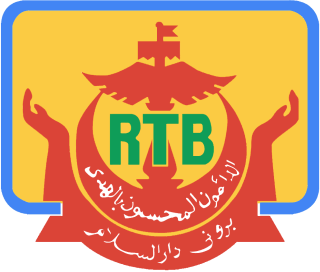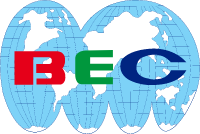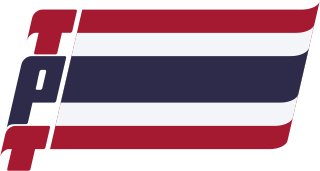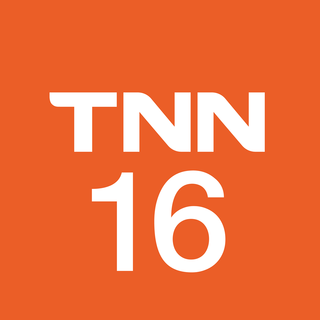
Hrvatska radiotelevizija, or Croatian Radiotelevision, is a Croatian public broadcasting company. It operates several radio and television channels, over a domestic transmitter network as well as satellite. HRT is divided into three joint companies – Croatian Radio, Croatian Television and Music Production, which includes three orchestras and a choir.

Radiotelevizija Slovenija – usually abbreviated to RTV Slovenija – is Slovenia's national public broadcasting organization.

The Philips circle pattern refers to a family of related electronically generated complex television station colour test cards. The content and layout of the original colour circle pattern was designed by Danish engineer Finn Hendil (1939–2011) in the Philips TV & Test Equipment laboratory in Amager near Copenhagen under supervision of chief engineer Erik Helmer Nielsen in 1966–67, largely building on their previous work with the monochrome PM5540 pattern. The first piece of equipment, the PM5544 colour pattern generator, which generates the pattern, was made by Finn Hendil and his group in 1968–69. The same team would also develop the Spanish TVE colour test card in 1973.
Media in Cambodia is largely unregulated and includes radio, television and print media outlets. Private sector companies have moved into the media sector, which represents a change from years of state-run broadcasting and publishing.

The Voice of Vietnam is the Vietnamese national radio broadcaster. Directly run by the Ministry of Finance alongside the Vietnam Television (VTV) and the Vietnam News Agency (VNA), VOV is tasked with promoting the policies of the Communist Party and the laws of the state.

Radio Television Brunei is the national public broadcaster of Brunei, headquartered at the Secretariat Building, Bandar Seri Begawan. Radio Brunei made its first broadcast on 2 May 1957, with a television service starting on 1 March 1975. Modelled after Radio Televisyen Malaysia (RTM), which is a government department, RTB came into its current state with its present name in 1975 after the merger of its radio and television services.
DVB-T2 is an abbreviation for "Digital Video Broadcasting – Second Generation Terrestrial"; it is the extension of the television standard DVB-T, issued by the consortium DVB, devised for the broadcast transmission of digital terrestrial television. DVB has been standardised by ETSI.

BEC World Public Company Limited, doing business as BEC World, is a Thai media conglomerate, best known as the operator of television Channel 3. It was founded in 1990 and listed on the Stock Exchange of Thailand in 1995, though the group began doing business in 1967 as Bangkok Entertainment Co., Ltd., now a subsidiary. The business was founded by Vichai Maleenont, and continues to be majorly owned by the Maleenont family, though the company underwent major restructuring in the 2010s in response to major losses following landscape changes in the broadcast industry. Over time, the business gradually expanded, leading to the growth of content businesses, such as the Global Content Licensing division and the establishment of BEC Studio and BEC Music.
In Thailand, television broadcasting started on 24 June, 1955. Color telecasts were started in 1967, and full-time color transmissions were launched in 1975. As of November 2020, there are currently 21 digital (DVB-T2) TV channels in Thailand.

Channel 3 HD is a Thailand and Bangkok's first commercial free-to-air television network that was launched on 26 March 1970 as Thailand and Bangkok's first commercial television station. Channel 3 is operated by BEC Multimedia Company Limited ("BECM") a subsidiary of publicly traded company BEC World. The network is headquartered in the Maleenont Tower of Bangkok. Its slogan is คุ้มค่าทุกนาที ดูทีวีสีช่อง 3.

National Broadcasting Services of Thailand (NBT) is the public broadcasting arm of the Government Public Relations Department (PRD), a division of the Thai Government. It operates comprehensive media services comprising radio, public television networks, online services and social media.

Channel 9 MCOT HD is a Thai state-owned free-to-air television network launched on 24 June 1955. It is owned by MCOT.
CTS Main Channel is the flagship free-to-air terrestrial television channel of the Chinese Television System network and is the third oldest free-to-air terrestrial television channel in the Republic of China (Taiwan) after TTV Main Channel and CTV Main Channel.

TTV Main Channel is the primary free-to-air terrestrial television channel of the Taiwan Television company and is the first television channel launched in the Republic of China (Taiwan).

Television Pool of Thailand is an organization established by Thai TV Channel 3, Royal Thai Army (RTA) Radio and Television Channel 5, BBTV Channel 7 and Channel 9 MCOT HD on 20 December 1968 to collaborate on live coverage of special events such as royal events, governmental events and addresses and sport games such as Olympic Games, Asian Games, SEA Games, and FIFA World Cup.

TNN is a Thai satellite, cable and digital terrestrial 24-hour news channel owned by Thai News Network (TNN) Co., Ltd., a unit of TrueVisions, a subsidiary of True Corporation, part of the Charoen Pokphand Group and Telenor, presents news, documentaries and sport news.
















